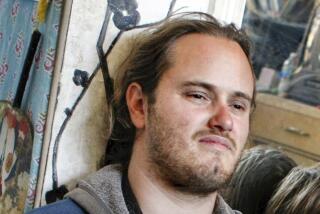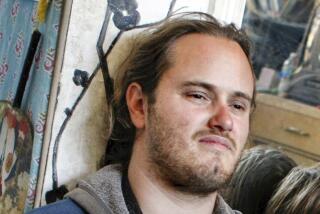Questions Mark End of Judgeâs DUI Case : Courts: Months of legal maneuvering end in a hung jury and mistrial. Following his car crash, he had failed parts of the field sobriety test and refused to take other parts. Prosecutor says sheâll charge him again.
BEVERLY HILLS â Guilty. Guilty. Ten times guilty. Thatâs how the vote came down in the jury room on the second floor of the Beverly Hills courthouse. But 10 votes add up to a hung jury, and Judge Edward L. Davenport walked away smiling from his trial on drunk driving charges.
Leaving the courthouse Tuesday, the Los Angeles Municipal Court judge declined to comment on his case, which ended in a mistrial after eight days of testimony and two days of loud, frustrating jury deliberations.
âOf course,â the judge replied when asked if he was smiling. As a Los Angeles city prosecutor, Davenport once won a U.S. Supreme Court ruling that allowed police to take blood samples from drunk driving suspects against their will.
In his own case, he failed parts of the field sobriety test and refused to take other parts. Later, he dumped the contents of a jar of urine into a toilet rather than let police use it as evidence, both sides agreed.
But Davenport, a North Hollywood resident, has hardly put all his troubles behind him.
Deputy Dist. Atty. Katherine Mader said she wants to charge him again as soon as she can, including the accusation that he refused to submit to a chemical test to measure the alcohol in his blood. If she does better with the next jury, the judge could face a 48-hour jail stay.
But for now, the months of legal maneuvering that followed Davenportâs car crash on the night of May 1, 1991, have ended in a big question mark.
âI had the gut feeling that he did do it, but the prosecution didnât prove it to me,â said the one juror who held out for a verdict of not guilty. A 12th juror was undecided.
The holdout, who asked that his name not be used, is a musician and Beverly Hills resident who once completed the first two weeks of training to be a Los Angeles police officer. He also passed the written exam to join the New York City police.
He said his brief time in blue had nothing to do with his doubts about Beverly Hills police officers in the Davenport case.
But he was especially wary of the testimony of Gary Livitski, the arresting officer, who said Davenport failed to walk a straight line and could not say the alphabet.
As did two other police witnesses, Livitski said the judge was abusive, bleary-eyed and smelled of alcohol.
But the juror said that the policeman, a 12-year veteran, lacked credibility. He was especially leery of Livitskiâs joking comment that he was âvaguely familiarâ with the Miranda rights that policemen routinely read to suspects before making arrests.
The other jurors had no such problems, especially after Davenport, a tall, red-faced man, took the stand in his own defense and admitted to having three whiskey-and-waters that night.
He spoke over the questions of the prosecutor and disregarded the orders of the presiding judge, Elden S. Fox, making Fox so angry that he ordered Davenport from the stand.
âMost of the people felt the defense hurt itself by having the defendant testify,â said juror Robert Taylor, an engineer and Ladera Heights resident.
But Jacob Adajian, Davenportâs lawyer, said he was betting that the jurors would go along with his reading of his client as a man with a difficult personality--drunk or sober.
âWeâll concede that the judge failed one test that night, but it was not a test the police officers talked about,â he said in his closing argument. âIt was the attitude test. He failed it from the word go, but thatâs not a crime.â
More to Read
Sign up for Essential California
The most important California stories and recommendations in your inbox every morning.
You may occasionally receive promotional content from the Los Angeles Times.










